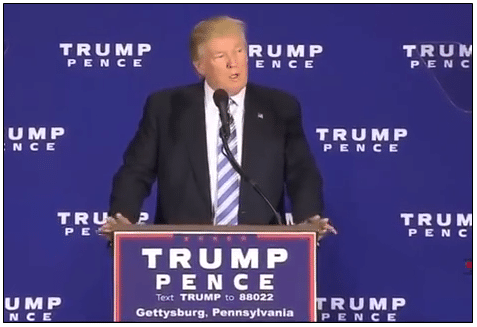“Citigroup: Trump win would cause immediate stock drop.”
“A Trump win would sink stocks.”
“Economists: A Trump win would tank the markets,” shrieks Politico.
These are just some of the headlines the American people have been treated to in the closing days of the election cycle, all intended of course to inspire fear of a win by Donald Trump in the election.
Basically, it’s just voter suppression by the financial and political media and establishment.
But we’ve seen this movie before.
Just months ago, international news agencies were pounding the United Kingdom with similar predictions of doom and gloom if that country left the European Union in the Brexit vote.
Even the Bank of England got in on the act. “Such a vote might result in an extended period of uncertainty about the economic outlook, including about the prospects for export growth. This uncertainty would be likely to push down on demand in the short run,” the central bank said in an unusual statement on the now-passed referendum.
The statement continued, “Uncertainty regarding the supply side of the economy might also increase, reflecting any alterations to product or labour market regulation, adjustments in labour flows or changes in the rate of technology adoption as a result of different arrangements governing foreign trade and capital flows. A vote to leave could have significant implications for asset prices, in particular the exchange rate.”
None of it was true of course.
Here the Bank of England was simply attempting to scare voters, threatening a recession or worse if Brexit occurred.
This is actually a pattern among financial institutions, like Citigroup, which regularly issue warnings any time voters or legislatures might democratically express their sovereignty, for example, by electing Donald Trump.
Numerous warnings were issued by banks and credit rating agencies should Greece leave the Eurozone. It would touch of a financial crisis, lead to a breakup of the currency bloc and touch off a stream of defaults by bondholders.
Same if the European Central Bank did not intervene and buy Italian and Spanish bonds.
Similar warnings were issued in the U.S. in 2011 when Congress briefly considered conditioning an increase in the national debt ceiling on a balanced budget amendment to the U.S. Constitution. Not raising the debt ceiling — and borrowing trillions of more dollars — would threaten a financial crisis and trigger a recession, the banks said.
In 2008, if Congress did not vote to bail out banks that bet poorly on U.S. housing, it would trigger a depression worse than the Great Depression. So the banks got hundreds of billions of dollars from Congress, and then hundreds of billions more from the Federal Reserve, which created money to buy back worthless mortgage-backed securities.
And oh, we got the worst recession since the Great Depression anyway.
Even puny little Iceland was threatened when bailing out the failed Icesave bank came up, and foreign investors were going to lose some money. They were threatened with credit downgrades and the like.
Not enough?
If the global trade agenda is not advanced by adopting the 12-nation Trans-Pacific Partnership — the largest trade agreement ever — it will be Smoot-Hawley all over again, tariffs galore and a return to the worst days of the Great Depression.
This happens all the time. The most powerful banks and news agenices in the world regularly use fear to influence sovereign legislatures and peoples to vote and act against their own interests — by threatening retaliation, reprisal and recession. These are the tools of tyrants.
With the exceptions of Iceland — which rejected a referendum in 2011 to bail out foreigners who invested in Icesave — and Great Britain, which left the European Union, few ever defy these powerful forces.
Even though there’s no reason not to. Nothing bad happened. In fact, in Iceland, which did not bail out its banks, the recession was shallower and unemployment dropped faster than other European countries, where the banks were bailed out. In the UK, there was a brief correction on the markets, which in turn corrected in a matter of days, but no financial crisis.
All the establishment does is issue hollow threats when it doesn’t get its way. Everything will start the global financial crisis in earnest. Nonsense.
The truth is, should the American people assert their independence on Tuesday by electing the anti-globalist Trump, perhaps it will teach these elites a lesson against governing by fear and crisis. Enough is enough. America first.
Robert Romano is the senior editor of Americans for Limited Government.







